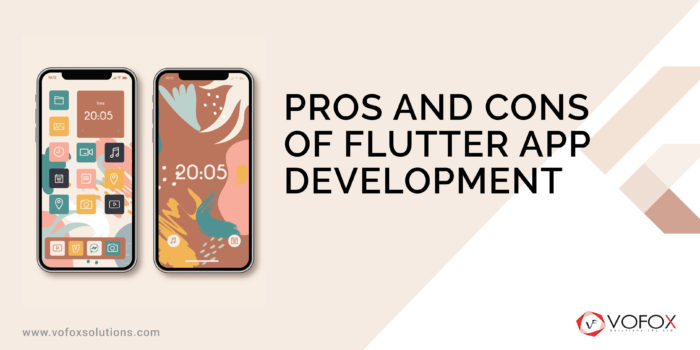- November 19, 2020 8:18 pm
- by Manek
- November 19, 2020 8:18 pm
- by Manek

Cross-platform mobile app development is now a lot easier than it was maybe three or four years ago, all thanks to hybrid mobile app development frameworks such as Flutter and Xamarin. Flutter was built by Google to develop hybrid mobile, desktop, and web apps. Flutter is now one of the trending mobile app software development kits (SDK) among many businesses and development teams worldwide. It’s an end-to-end UI toolkit that has a variety of tools and widgets that helps you ship cross-platform mobile apps faster and efficiently.
In this blog post, we will explore some of the major pros and cons of flutter app development and some of the benefits that you can get when you hire flutter app developers for your next cross-platform mobile app development project.
Flutter app development services uses a clear layered architecture that exists as a series of independent libraries that depend on the hardware. Apps that are built on Flutter are packaged to the OS exactly as a native application. Flutter is more than just a framework for developing cross-platform apps. Flutter provides us a rich set of controls for Material and Cupertino libraries, Basic foundational classes, rendering, and widget layers.
Flutter uses a platform-specific embedder that allows the OS to manage the message event loop and communicate with services such as input, accessibility, and rendering. An embedder allows developers to integrate flutter code into an existing application as a module. The language in which the embedder is written can vary depending upon the operating system. The embedder for iOS is written in Objective-C++/Objective-C and Java and C++ for Android. At its core, Flutter uses an engine written in C++ that is based on the Dart programming language. Thanks to the Skia C++ graphics engine, Flutter eliminates complex interactions with the underlying hardware components and eliminates the need for a bridge that slows down your app.
Flutter is built on a flexible architecture that allows developers to easily add new features, experiment, and debug faster. If you go Native, you should maintain separate development teams for both Android and iOS. However, Flutter allows developers to use a single codebase. Hence, building your mobile app on Flutter can save you tons of development time as you only need to maintain one single development team. This helps you to ship your product faster, minimize risk, and eliminate communication hassles. All while enjoying the benefits of native performance.
When compared to other mobile app development frameworks, Flutter app development is more dynamic and agile. This is because Flutter uses a cool feature called hot reload that enables you to make changes in your code and see the changes in your app in real-time. Hot reload can come in handy when you are collaborating with a designer to improve your app’s look. This feature gives you the convenience to add more features in less time. Additionally, hot reloading also makes it easier for you to add more new features frequently to keep your users engaged.
The documentation of Flutter is crisp and clear and there are tons of free tutorials available online. Additionally, it has a growing developer community around the world who are willing to assist and share their knowledge with you.
Flutter has got a variety of built-in widgets and APIs. They include rich motion APIs, Cupertino (iOS) and Material Design (Android) widgets, and much more. The widgets that are available with Flutter can make your user interface more flexible. This makes it easy for you to reuse these modules for layouts with other configurations. On the other hand, you or your Flutter app developers can build new widgets – customized to your needs by accessing the lowest level of the code.
Mobile Apps that are built using Flutter won’t consume a lot of your development time which makes them less expensive when compared to native app development. As Flutter enables developers to ship products faster, It is perfect for building Minimum Viable Products (MVPs).
Flutter allows you to reuse 100% of the code between iOS and Android apps. Its code reusability helps you to build your product faster.
Since Flutter apps lack a bridge to communicate with native components, the performance that we get from apps that are built on Flutter can be compared to native apps. Moreover, Flutter apps deliver 60 or 120 frames per second (fps) performance on devices that have 120Hz screen refresh rates. This helps you to develop apps that are capable of delivering performance similar to that of native apps.
Flutter can interact with your device’s hardware components flawlessly similar to that of native apps. When compared to other hybrid apps, Flutter supports a variety of native APIs.
New SDKs won’t be available in Flutter as soon as a new feature is released on iOS or Android. Whereas in native apps, new SDKs are made available with the updates much faster than for hybrid mobile app frameworks.
Guaranteed Response within One Business Day!
What is Infrastructure as Code (IaC)?

Front-End Performance in 2026: What Core Web Vitals Actually Mean for Your Site

What is FinOps?

Micro-Frontends: Breaking Down Monolithic React Applications
.png)
Zero-Trust Security Models for SaaS: What You Need to Know